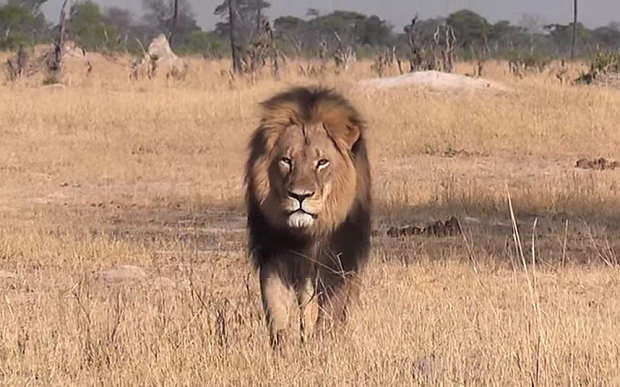Monday
I’m coming late to the Cecil the Lion story. For those who you who also missed it, an American dentist in search of a trophy head lured the iconic lion out of his refuge and shot him with a crossbow. The world exploded in anger, with people feeling (to quote Wordsworth) “that there hath past away a glory from the earth.”
I’m also reminded of lines from Oliver Wendell Holmes’s poem “Old Ironsides, which was written to protest the scrapping of the U.S.S. Constitution:
The harpies of the shore will pluck
The eagle of the sea.
Here’s the best literary account that I can think of about the killing of a majestic lion:
When once Asian had been tied (and tied so that he was really a mass of cords) on the flat stone, a hush fell on the crowd. Four Hags, holding four torches, stood at the corners of the Table. The Witch bared her arms as she had bared them the previous night when it had been Edmund instead of Asian. Then she began to whet her knife. It looked to the children, when the gleam of the torchlight fell on it, as if the knife were made of stone, not of steel, and it was of a strange and evil shape.
As last she drew near. She stood by Asian’s head. Her face was working and twitching with passion, but his looked up at the sky, still quiet, neither angry nor afraid, but a little sad. Then, just before she gave the blow, she stooped down and said in a quivering voice,
“And now, who has won? Fool, did you think that by all this you would save the human traitor? Now I will kill you instead of him as our pact was and so the Deep Magic will be appeased. But when you are dead what will prevent me from killing him as well? And who will take him out of my hand then? Understand that you have given me Narnia forever, you have lost your own life and you have not saved his. In that knowledge, despair and die.”
The children did not see the actual moment of the killing. They couldn’t bear to look and had covered their eyes.
As soon as the wood was silent again Susan and Lucy crept out onto the open hill-top. The moon was getting low and thin clouds were passing across her, but still they could see the shape of the Lion lying dead in his bonds. And down they both knelt in the wet grass and kissed his cold face and stroked his beautiful fur – what was left of it – and cried till they could cry no more. And then they looked at each other and held each other’s hands for mere loneliness and cried again…
C. S. Lewis is clearly alluding to Christ’s crucifixion in Aslan’s execution. The killing of Cecil does not carry that resonance—his death does not cleanse us of our sins, nor will we see a resurrection—but it did speak to something deep with us.
Now if we could only get just as upset over all the needless slaughter of humans in the world.
Further thought: Of course, the ultimate story about lion killing is Ernest Hemingway’s “Short Happy Life of Francis Macomber”–a misogynistic story filled with emasculation fears. It contains the following wrenching passage where tourist hunter Macomber loses his nerve and the respect of his wife:
[T]hey had just moved into the grass when Macomber heard the blood-choked coughing grunt, and saw the swishing rush in the grass. The next thing he knew he was running; running wildly, in panic in the open, running toward the stream.
He heard the ca-ra-wong! of Wilson’s big rifle, and again in a second crashing carawong! and turning saw the lion, horrible-looking now, with half his head seeming to be gone, crawling toward Wilson in the edge of the tall grass while the red-faced man worked the belt on the short ugly rifle and aimed carefully as another blasting carawong! came from the muzzle, and the crawling, heavy, yellow bulk of the lion stiffened and the huge, mutilated head slid forward and Macomber, standing by himself in the clearing where he had run, holding a loaded rifle, while two black men and a white man looked back at him in contempt, knew the lion was dead. He came toward Wilson, his tallness all seeming a naked reproach…
By hunting Cecil with a crossbow rather than a rifle, perhaps the dentist wanted to prove that he was no Francis Macomber. He certainly was on Hemingway’s wavelength.
